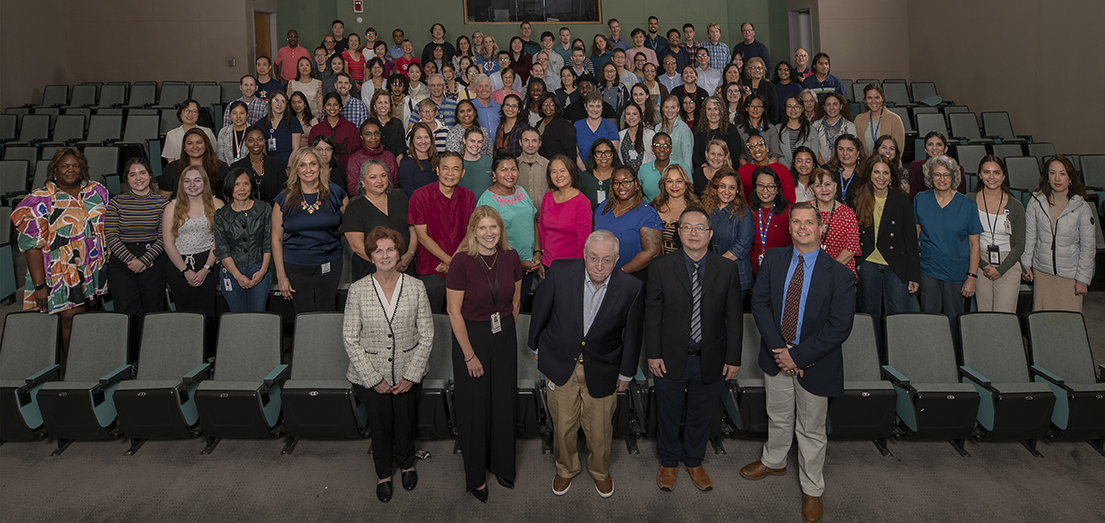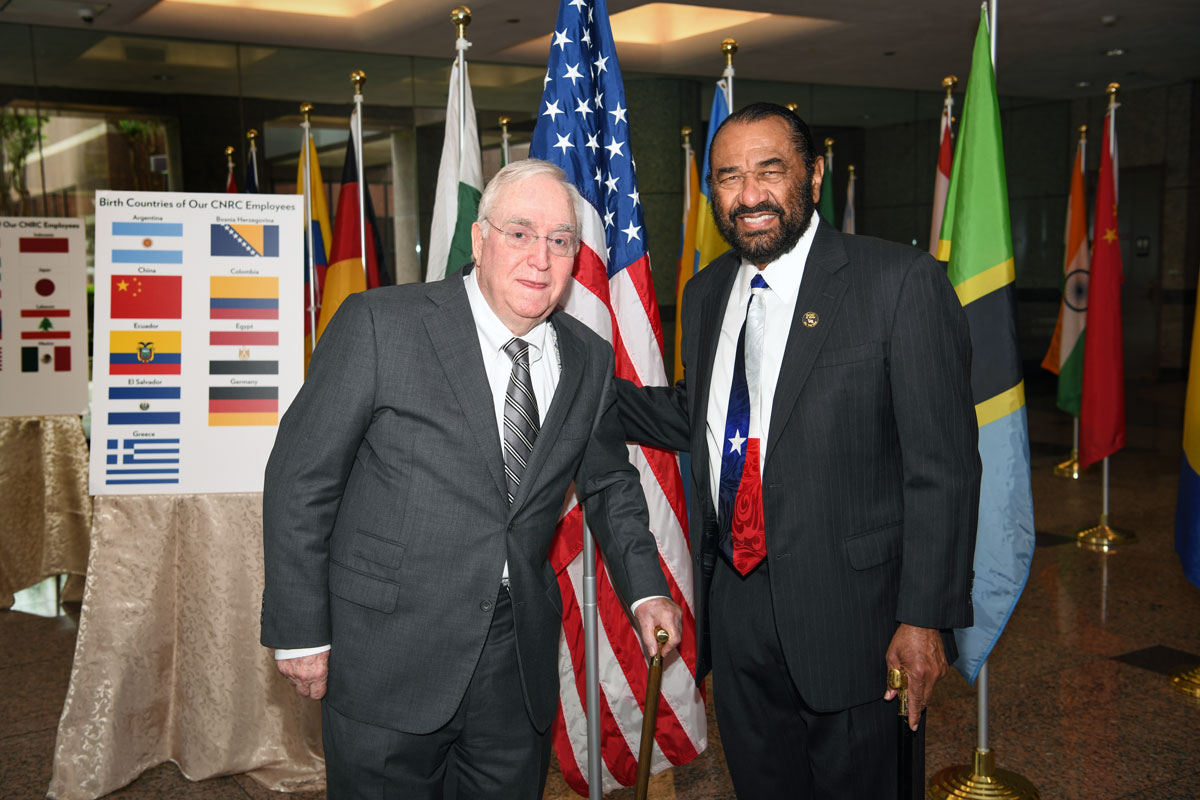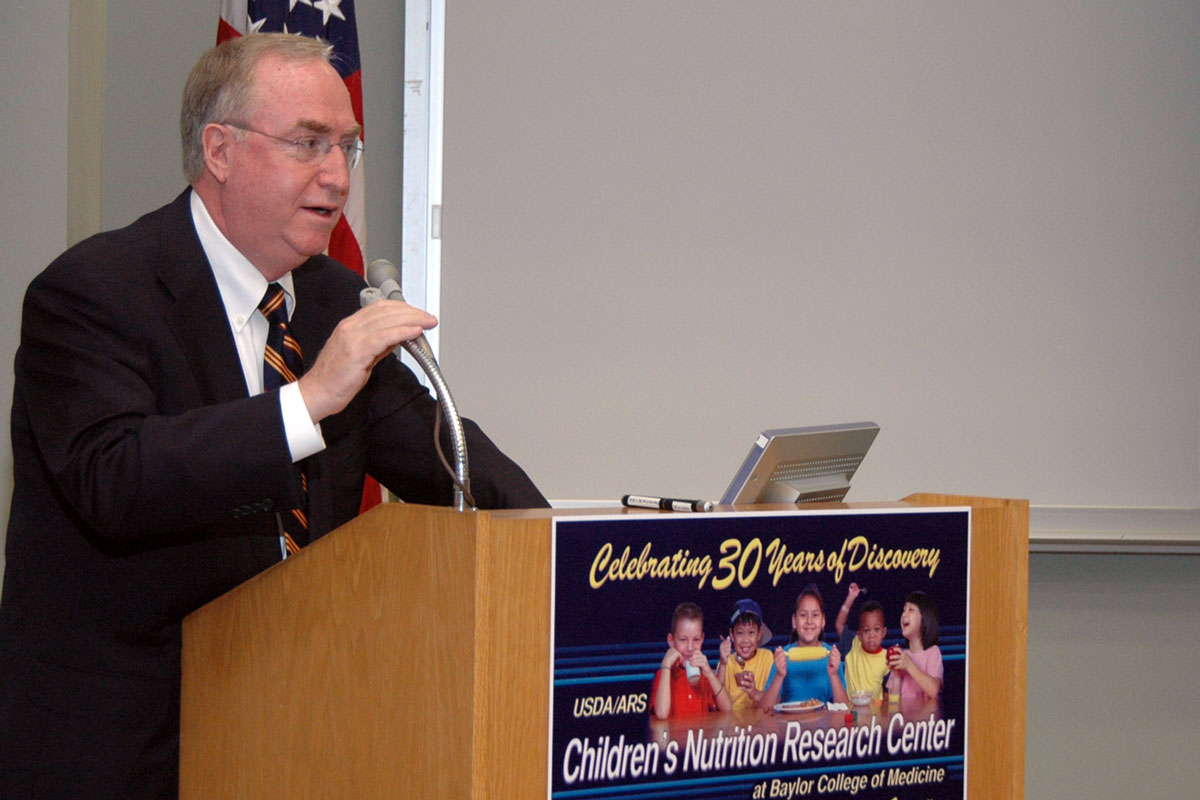

In its 45-year history, the U.S. Department of Agriculture (USDA)/Agricultural Research Service (ARS) Children’s Nutrition Research Center (CNRC) at Baylor College of Medicine has had only two directors: Dr. Buford Nichols and Dr. Dennis Bier.
Now, after an impressive 30-year career leading the CNRC, Dr. Bier is retiring from his role as Director of the Center and Chief of the Nutrition Division. In this role, he has guided research initiatives, secured funding, managed a faculty of physicians and scientists, supported a close working relationship with the USDA/ARS and its research priorities and overseen the center’s facilities. Following his retirement, Dr. Bier will transition to Distinguished Emeritus Professor of Pediatrics at Baylor College of Medicine.
“Dr. Bier’s dedication to advancing pediatric nutrition research has left a significant mark on the scientific community and society,” said Dr. Paul Klotman, President, CEO and Executive Dean of Baylor College of Medicine. “His leadership, scholarship and commitment to improving children’s health through his work at the Children’s Nutrition Research Center and beyond have inspired generations of researchers. Denny will be missed at Baylor College of Medicine and Texas Children’s Hospital, but he leaves a legacy to be celebrated.”

The CNRC is a national leader in promoting children’s nutritional health. A multidisciplinary pediatric nutrition research center, the CNRC conducts basic and clinical research on a wide range of topics impacting childhood nutrition and diseases affected by nutrition. CNRC researchers seeks answers to questions such as:
“Many other nutrition centers around the world are more specific in focus. Our diversity is an advantage to us in pursuing compelling nutrition research,” said Dr. Bier.
The CNRC is one of just six USDA/ARS research centers in the U.S., and it holds the distinction of being a pediatric nutrition research center that is fully integrated within a larger medical campus.
Three USDA/ARS research centers are federal facilities: Beltsville Agricultural Research Center in Beltsville, Maryland; Grand Forks Human Nutrition Research Center in Grand Forks, North Dakota; and the USDA Western Human Nutrition Center at the University of California – Davis.
The remaining three research institutions, a group that includes Baylor’s CNRC, operate under cooperative agreements with the federal government. The two other centers are the Jean Mayer Human Nutrition Research Center on Aging at Tufts University in Boston, Massachusetts, and the Arkansas Children’s Nutrition Center at the University of Arkansas for Medical Sciences – Little Rock, a considerably smaller pediatric center that was established after the CNRC.
In the late 1970s, there was a widespread vision for a nutrition research center dedicated exclusively to children, to be built on a medical campus to foster greater connections and collaboration with the medical nutrition community, particularly in various specialties. In response, Dr. Nichols spearheaded Baylor’s application to the USDA to host this center. In 1978, the cooperative venture between Baylor, Texas Children’s and the federal government was established.
For its first 10 years, the CNRC rented space in the Texas Medical Center. Then in October 1988, the CNRC moved into a new building connected to Texas Children’s, where it remains today. It includes state-of-the-art small and large animal research facilities and unique body composition and energy expenditure facilities. It houses room calorimeters, mass spectrometry laboratories for analysis of non-radioactive tracer studies, a live-in human metabolic research unit and metabolic kitchen, eating behavior observation laboratories and a rooftop greenhouse for plant research.
CNRC staff includes post-doctoral researchers and scientists with both PhD and MD degrees, who hold faculty appointments at Baylor. These physician-scientists cover a range of specialties such as endocrinology, gastroenterology and neonatology, and maintain a clinical practice at Texas Children’s.
“I’m fully committed to medical research by physicians, and my goals have been to develop other physician-scientists while maintaining diversity of discipline and topic areas for research,” said Dr. Bier. “Medical scientists assess problems differently than PhD scientists, from how they study these issues to how they create the hierarchy of importance and view the implications of their findings.”
The cooperative agreement between Baylor and the federal government, which supports half the CNRC’s operating budget, must be renewed every five years. During Dr. Bier’s tenure, the agreement has been renewed six times and he has helped maintain a successful and thriving academic-government partnership in which all parties are satisfied. Meanwhile, Dr. Bier and his faculty have also worked diligently to secure grant funding from sources beyond the USDA/ARS, such as the National Institutes of Health (NIH).

“I entered medical school in 1962, so it was 62 years ago that I arrived on an academic medical school’s hospital campus and I never left,” said Dr. Bier. “I’ve been in a scholarly hospital environment ever since.”
Upon graduating from the New Jersey of College of Medicine in 1966, Dr. Bier completed his residency in pediatrics at the University of California San Francisco (UCSF).
“My interests in macronutrient fuel metabolism started when, as a medical student, I became aware of the serious clinical problem that sick people, particularly sick infants and children, face by having to feed themselves while seriously ill and unable to consume food voluntarily,” said Dr. Bier.
“At UCSF, the academic physician-scientists who mentored me paved the road on which I built my subsequent career,” he continued. “My desire to become an academic physician-scientist became firmly established owing to the exemplary models of physician-scientists such as Mel Grumbach and Selna L. Kaplan in pediatric endocrinology, Abe Rudolph and Julien I.E. Hoffman in pediatric cardiology and William H. Tooley in neonatology, who showed by daily example that physicians could deliver the highest-quality clinical care while conducting patient-oriented research into the fundamental causes of the medical conditions within their area of clinical expertise.”
At that time, the field of pediatric endocrinology was primarily focused on hormonal disorders and secondarily on metabolites under hormonal control. Given Dr. Bier’s interest in metabolic disorders, he completed a postdoctoral fellowship in Dr. Richard Havel’s laboratory at UCSF’s Cardiovascular Research Institute, in which he studied the biological components of lipoproteins and developed his expertise in macronutrient metabolism.
Because pediatric lipoprotein disorders were considered relatively uncommon at that time, often not requiring treatment until after adolescence, Dr. Bier completed another fellowship focused on diabetes and metabolism, specifically on the clinical study of children with hypoglycemia (low blood sugar), in Dr. David Kipnis’ laboratory at Washington University School of Medicine in St. Louis, Missouri.
Over time, the pediatric endocrinology field evolved to incorporate both diabetes and related metabolic disorders.
Metabolism – especially the role of disordered metabolism in the development of disease – has continued to be a research focus for Dr. Bier. He has been instrumental in developing the field of nonradioactive, stable isotopes as safe tracers in children to study various metabolic dynamics for which blood samples measuring concentration alone are insufficient.
For the first 19 years of his career, Dr. Bier was an Associate Professor of Pediatrics at Washington University and, later, Program Director of the NIH Pediatric Clinical Research Center for this same institution, among other leadership titles.
It was his relationship with the late Dr. Ralph Feigin that brought him to Baylor and Texas Children’s. Dr. Feigin, former Physician-In-Chief at Texas Children’s and Chairman of Pediatrics at Baylor, and Dr. Bier met in 1971 when Dr. Bier went to St. Louis as a fellow and Dr. Feigin was a professor at Washington University.
“Ralph Feigin was a remarkable individual and a personal friend, and I respected him. I knew I could trust him as a Department Chair,” said Dr. Bier. “I was quite happy at Washington University – I had senior responsibilities and grants. But I wanted the opportunity at the CNRC, which was and still is truly unique, and I wanted to be associated with a medical complex that has most everything.”
Upon arriving at Texas Children’s and Baylor in 1993 and assuming the directorship of the CNRC, Dr. Feigin also appointed Dr. Bier to the advisory committee of the NIH Pediatric Clinical Research Center. A year later, Dr. Bier also became the Program Director of the Clinical Research Center.
“Texas Children’s is unquestionably one of the best full-service children’s hospitals in the world. No one can question the clinical care and research that exists here,” said Dr. Bier.

Under Dr. Bier’s leadership, the CNRC has contributed to significant, groundbreaking discoveries on improving nutrition science in children. It is not an exaggeration to say that many CNRC faculty are internationally recognized in the field of pediatric nutrition. Their work forms the foundation for much of the essential nutrient Dietary Reference Intake values in infancy and childhood, particularly in body composition, energy metabolism and mineral and macronutrient requirements.
Similarly, other faculty are world leaders in understanding the development of childhood eating behaviors and approaches to addressing these conditions.
CNRC faculty are members of virtually every major international group providing nutritional guidelines for children, including the Dietary Guidelines for Americans, the American Heart Association, the American Diabetes Association, the American Gastroenterological Association, the World Health Organization and the Food and Agriculture Organization.
“Our first responsibility is to perform really good research that prompts people in other parts of the world to say ‘Why didn’t I think of that?’ or informs them of something they didn’t think about before,” said Dr. Bier.
CNRC basic scientists provide foundational insights into genetic and epigenetic regulatory and physiological control mechanisms for nutritional metabolism and dietary nutrient bioavailability from infancy through adolescence.
“Since I no longer direct my own research program, what I am most proud of is the outstanding accomplishments of the CNRC faculty, most of whom I’ve had the distinct pleasure of recruiting to Baylor,” Dr. Bier said. “It is my honor to watch them advance scientifically and see them make important contributions to the nutritional health of infants and children by developing their own compelling questions that require innovative experiments to answer.”
Dr. Bier has held major leadership roles in scientific societies and associations, has served on many review committees for other clinical research centers and has won several noteworthy awards, including election to the National Academy of Medicine and Fellowship in the American Association for the Advancement of Science, the NIH Award for Excellence in Clinical Research, the Nutrition Award from the American Academy of Pediatrics, the David Kritchevsky Career Achievement Award in Nutrition from the American Society for Nutrition and the Distinguished Service Award from Washington University.
Following his retirement and the appointment of his successor, Dr. Bier plans to spend more time with his family, including his grandchildren, in Huntington Beach, California.
“Dr. Bier has held many roles and titles across the medical field over the years and through every area he has served, he always kept every patient and family at the forefront,” said Mark A. Wallace, CEO of Texas Children’s. “His passion for pediatric nutritional medicine and teaching the next generation of physicians will undoubtedly have an impact on health care for years to come, and his legacy will live far on beyond his much-deserved retirement.”